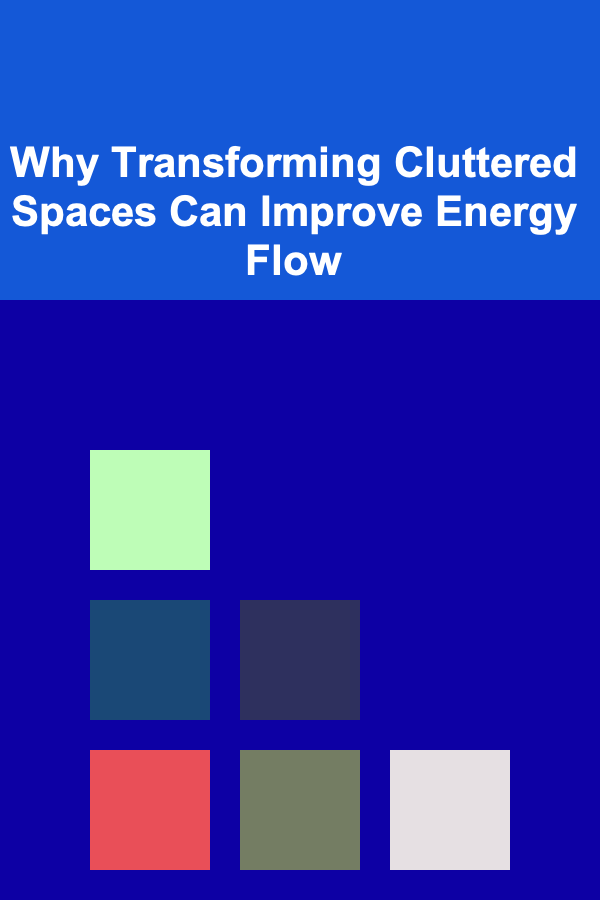
Why Transforming Cluttered Spaces Can Improve Energy Flow
ebook include PDF & Audio bundle (Micro Guide)
$12.99$7.99
Limited Time Offer! Order within the next:

The environment we inhabit plays a crucial role in shaping our mental, emotional, and physical well-being. Cluttered spaces can often lead to feelings of stress, anxiety, and disorganization. Transforming these chaotic environments into organized and harmonious spaces can significantly improve energy flow, leading to enhanced productivity, peace of mind, and overall wellness. In this comprehensive article, we will explore the relationship between clutter and energy flow, the psychological and physiological impacts of clutter, and practical strategies for transforming cluttered spaces.
Understanding Clutter and Its Impact
1.1 What is Clutter?
Clutter refers to the accumulation of items that are disorganized, unnecessary, or unwanted. It can manifest in various forms, including physical items strewn about a room, digital files crowding our devices, or even mental clutter stemming from unresolved thoughts and worries. Clutter can be a reflection of our lifestyle, habits, and mindset, often accumulating over time due to busy schedules and lack of organizational systems.
1.2 The Psychological Effects of Clutter
Numerous studies have shown that excessive clutter can lead to a range of psychological issues. Some common effects include:
- Increased Stress Levels: Clutter can trigger feelings of overwhelm, as it serves as a constant reminder of tasks left undone.
- Reduced Focus: A messy environment can make it difficult to concentrate, as distractions compete for our attention.
- Lower Motivation: The presence of clutter can sap our motivation, making it harder to start new projects or maintain productivity.
These psychological effects can contribute to a negative feedback loop, where stress leads to more clutter, which in turn increases stress levels.
1.3 The Physiological Impacts of Clutter
Beyond psychological effects, clutter can also have physiological implications. Living and working in cluttered spaces has been linked to:
- Poor Sleep Quality: Clutter in bedrooms can create a sense of chaos, making it harder to relax and fall asleep.
- Reduced Physical Activity: Clutter can impede movement within a space, discouraging physical activity and exercise.
- Health Issues: Chronic stress linked to clutter can lead to long-term health problems, including cardiovascular issues and weakened immune response.
Understanding these impacts is essential for recognizing the importance of transforming cluttered spaces.
Energy Flow: A Conceptual Overview
2.1 Defining Energy Flow
Energy flow refers to the movement and circulation of energy within a space. This concept is rooted in various philosophies, including feng shui and holistic wellness practices, which suggest that the arrangement of our environment can influence the flow of energy, or "chi." An uninterrupted flow of energy promotes harmony, balance, and vitality, while blockages can lead to stagnation and discomfort.
2.2 Cultural Perspectives on Energy Flow
Different cultures have their own interpretations of energy flow:
- Feng Shui: An ancient Chinese practice that emphasizes the arrangement of space to optimize the flow of chi, fostering tranquility and prosperity.
- Vastu Shastra: A traditional Indian architectural system that focuses on harmonizing structures with natural elements to promote positive energy.
- Japanese Zen Philosophy: Advocates for simplicity and minimalism, encouraging uncluttered spaces that allow for clear energy flow.
Exploring these cultural perspectives reveals a shared understanding of the importance of energy flow in creating peaceful and productive environments.
The Connection Between Clutter and Energy Flow
3.1 How Clutter Disrupts Energy Flow
Clutter disrupts energy flow in several ways:
- Physical Blockages: Items scattered in a space can obstruct pathways, making it difficult for energy to circulate freely.
- Visual Distractions: Clutter creates visual noise, overwhelming the senses and making it hard to focus on important tasks.
- Emotional Weight: Clutter often carries emotional baggage, bringing up feelings of guilt, shame, or nostalgia that can hinder positive energy flow.
By understanding how clutter disrupts energy flow, we can begin to see the value in transforming our spaces.
3.2 The Benefits of Organized Spaces
Transforming cluttered spaces into organized environments offers numerous benefits:
- Enhanced Focus and Productivity: Organized spaces allow for clearer thinking and increased concentration.
- Reduction in Stress Levels: A decluttered environment fosters a sense of calm and control, leading to lower stress.
- Improved Well-Being: A harmonious environment promotes positive emotions and overall well-being.
These benefits illustrate why it's essential to prioritize the transformation of cluttered spaces.
Practical Strategies for Transforming Cluttered Spaces
4.1 Decluttering Techniques
To transform a cluttered space, start with effective decluttering techniques:
- The Four-Box Method: Label boxes as "keep," "donate," "discard," and "relocate." Sort items into these categories to simplify decision-making.
- The 30-Day Minimalism Game: Challenge yourself to remove one item on the first day, two on the second, and so on, until the month is over.
- Time-Limited Sessions: Set a timer for 15-30 minutes to focus on decluttering specific areas without becoming overwhelmed.
These techniques can make the decluttering process more manageable and less intimidating.
4.2 Creating Functional Spaces
Once decluttering is complete, focus on creating functional spaces:
- Designate Zones: Assign specific areas for different activities (e.g., work, relaxation, hobbies) to enhance efficiency.
- Use Multi-Functional Furniture: Invest in furniture that serves multiple purposes, such as storage ottomans or fold-out desks.
- Organizational Tools: Utilize baskets, bins, and shelves to keep items organized and easily accessible.
By creating functional spaces, you can ensure that your environment supports your lifestyle and promotes positive energy flow.
4.3 Incorporating Nature and Light
Integrating natural elements into your space can further enhance energy flow:
- Plants: Adding greenery can purify the air and create a calming atmosphere.
- Natural Light: Maximize natural light by using sheer curtains or placing mirrors strategically to reflect light and create openness.
- Natural Materials: Use materials like wood, stone, and cotton to foster a connection with nature.
These elements can create a more inviting and harmonious environment.
Case Studies: Successful Transformations
Analyzing real-life examples of successful transformations can provide inspiration and insight into the process of decluttering and enhancing energy flow:
Case Study 1: The Home Office Transformation
A freelance graphic designer struggled with clutter in her home office. Piles of papers, outdated supplies, and unorganized tech equipment created a chaotic environment that stifled her creativity. By implementing the four-box method, she cleared out unnecessary items and designated specific zones for work, inspiration, and storage. The result was a serene workspace that improved her focus and productivity.
Case Study 2: The Bedroom Revamp
A couple found that their cluttered bedroom negatively impacted their sleep quality and relationship. They decided to tackle the mess by removing excess furniture and adopting a minimalist approach. They incorporated soft lighting, calming colors, and plants to create a restful environment. The transformation led to improved sleep and a stronger emotional connection.
Case Study 3: The Family Living Room
A family with young children faced constant chaos in their living room, filled with toys, books, and miscellaneous items. By creating designated play areas and utilizing stylish storage options, they transformed the space into a functional area for both play and relaxation. This change allowed family members to enjoy their time together without feeling overwhelmed by clutter.
Maintaining an Organized Space for Sustained Energy Flow
Transforming cluttered spaces requires ongoing effort to maintain organization and positive energy flow:
6.1 Establishing Routines
Create daily or weekly routines for tidying up and decluttering. This can include:
- Daily Tidying: Spend a few minutes each day putting things back in their designated spots.
- Weekly Reviews: Set aside time each week to assess your space and address any emerging clutter.
6.2 Adapting to Changes
Life is dynamic, and so are our needs. Be prepared to adapt your organizational systems as circumstances change, whether due to new family members, changes in work habits, or shifts in personal interests.
6.3 Mindfulness Practices
Incorporating mindfulness practices into your routine can help maintain a sense of peace and clarity in your space. This may include:
- Meditation: Taking time to center yourself can cultivate awareness of your surroundings and encourage intentional living.
- Gratitude Journaling: Reflecting on what you appreciate in your environment can foster a more positive relationship with your space.
Conclusion
Transforming cluttered spaces into organized environments is not just about aesthetics; it is a profound way to enhance energy flow, improve mental and physical well-being, and foster a sense of harmony in our lives. By understanding the connection between clutter and energy flow, employing practical decluttering strategies, and committing to maintaining organized spaces, we can create environments that nurture creativity, productivity, and overall happiness. Embrace the journey of transformation, and witness the positive shifts that unfold in your life and energy flow.

How to Create a Realistic Home Budget
Read More
How to Organize Your Books for Easy Reference
Read More
How to Organize Your Garden Tools and Supplies
Read More
How to Stage Your Bedroom to Create a Relaxing Oasis
Read More
The Ultimate Guide to Finding Free or Low-Cost Educational Resources Online
Read More
Top Benefits of Utilizing Ride-Sharing Services for Commuting Daily
Read MoreOther Products

How to Create a Realistic Home Budget
Read More
How to Organize Your Books for Easy Reference
Read More
How to Organize Your Garden Tools and Supplies
Read More
How to Stage Your Bedroom to Create a Relaxing Oasis
Read More
The Ultimate Guide to Finding Free or Low-Cost Educational Resources Online
Read More